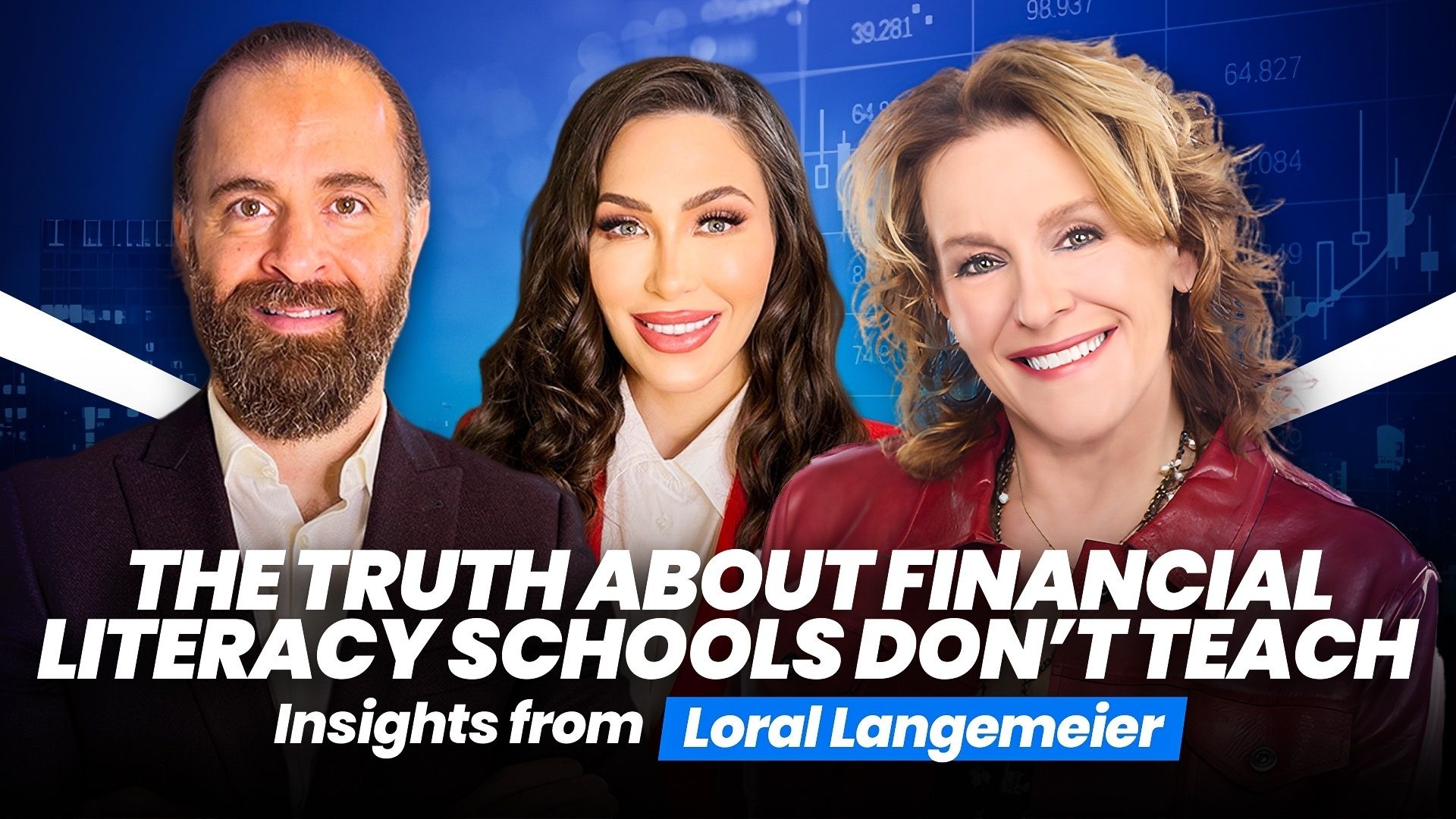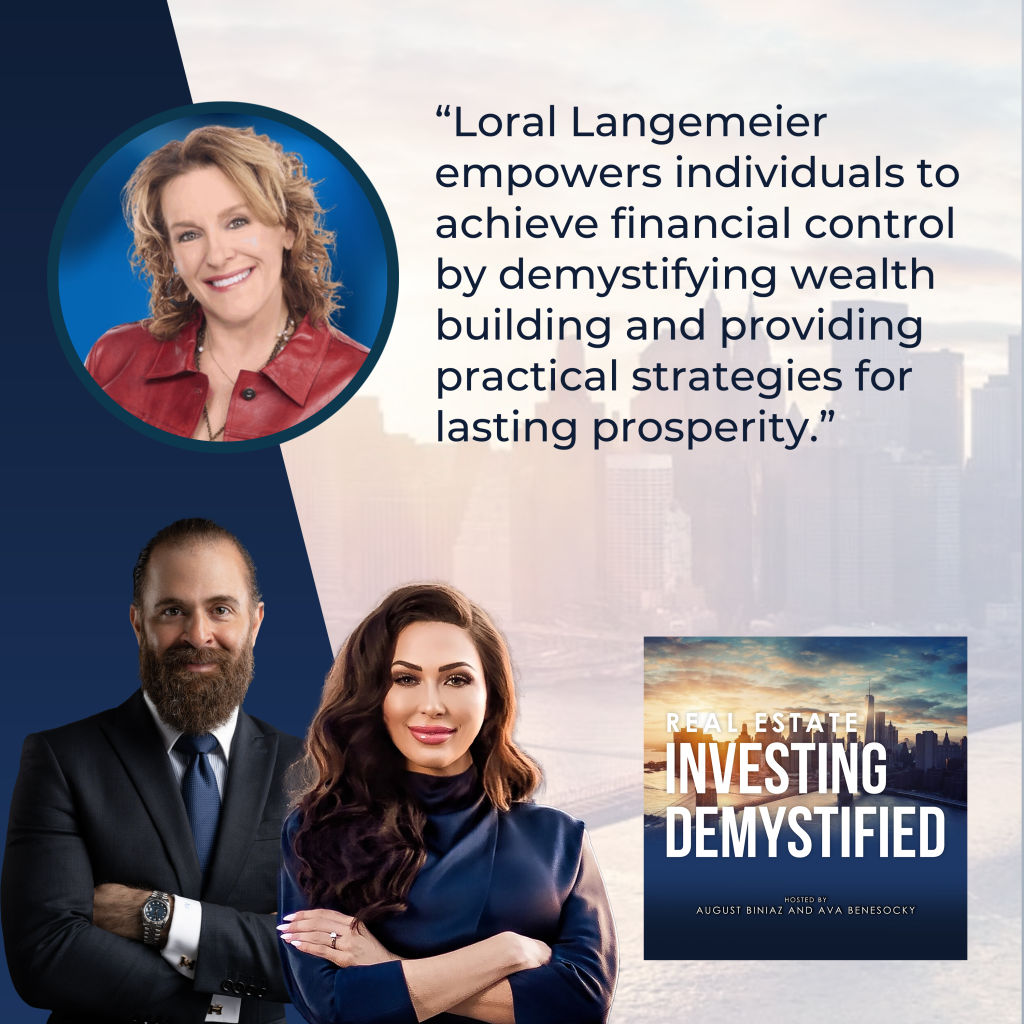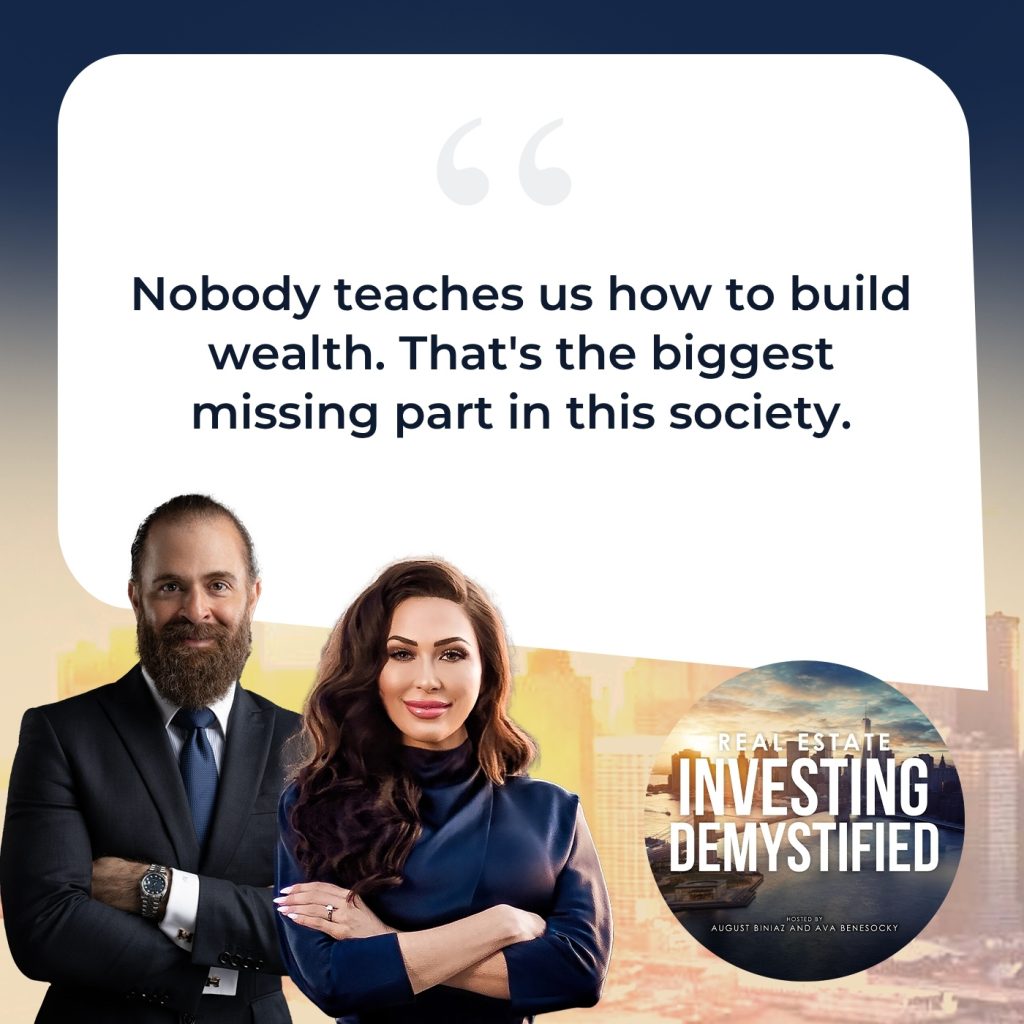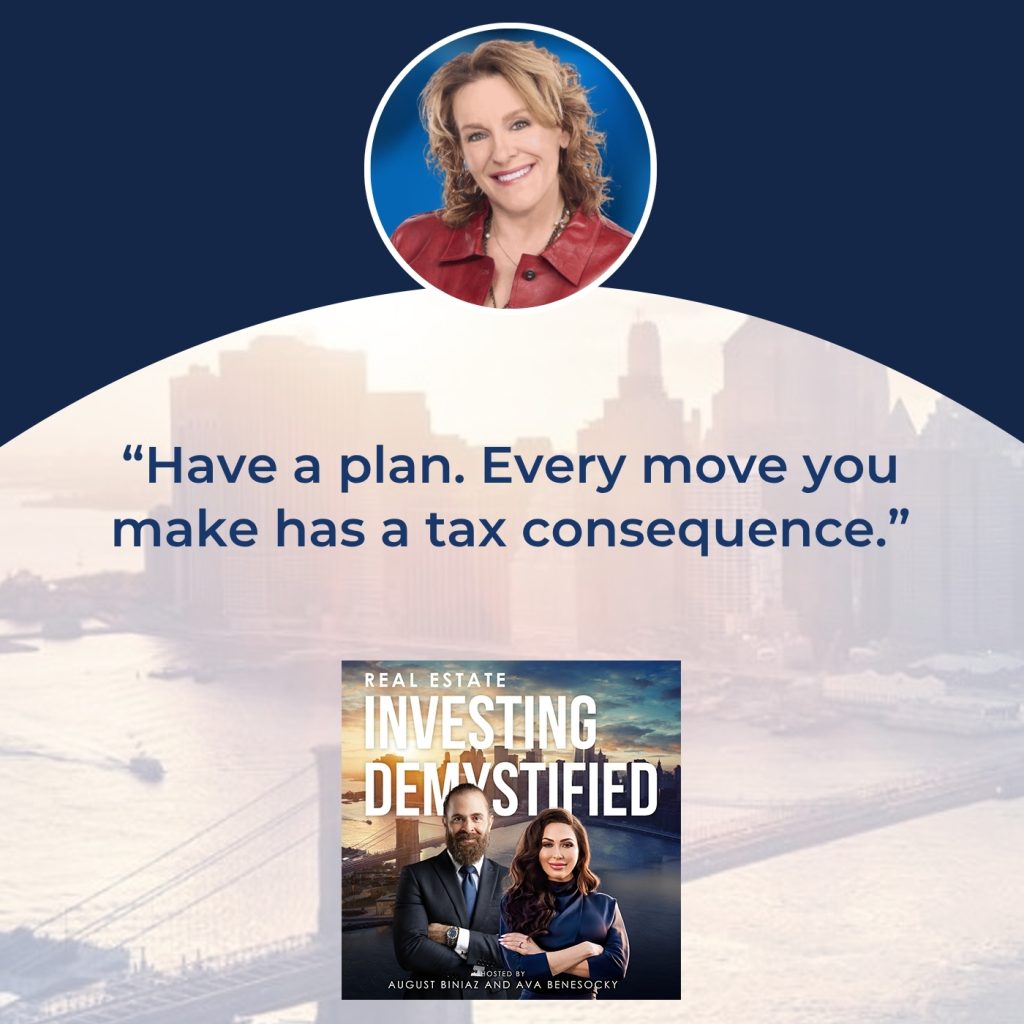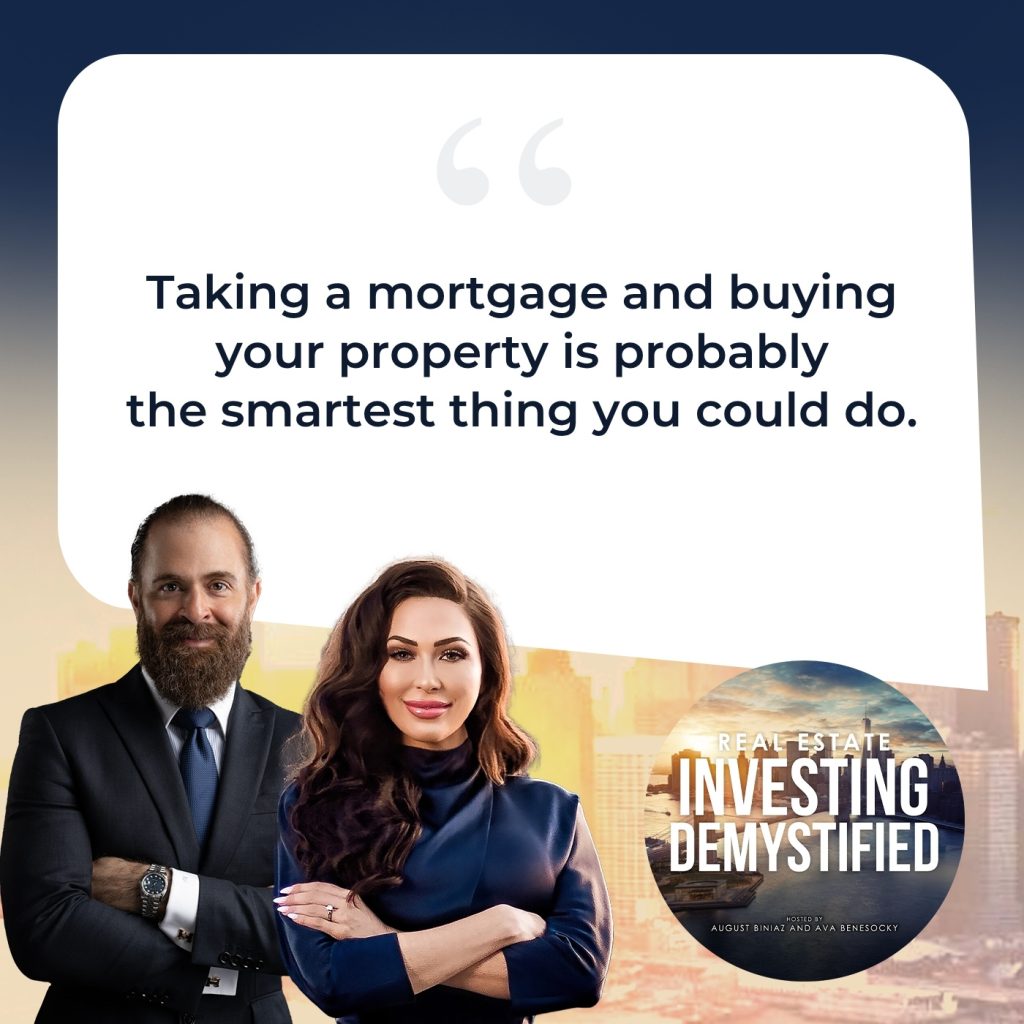Financial literacy isn’t just about earning money; it’s about learning how to keep it, grow it, and make it work for you. In this eye-opening conversation, wealth expert and The Millionaire Maker author Loral Langemeier joins us to unpack the money lessons schools never teach. From understanding taxes and corporate structure to building generational wealth through real estate and entrepreneurship, Loral shares practical strategies that help people at every level move from financial confusion to financial control. Her message is clear: if you want lasting wealth, you have to think and live like a millionaire.
Get in touch with Loral Langemeier:
- Website: https://www.lorallangemeier.com
- LinkedIn: linkedin.com/in/lorallangemeier
- YouTube Show: https://www.youtube.com/lorallangemeier
If you are interested in learning more about passively investing in multifamily and Build-to-Rent properties, click here to schedule a call with the CPI Capital Team or contact us at info@cpicapital.ca. If you like to Co-Syndicate and close on larger deals as a General Partner, click here. You can read more about CPI Capital at https://www.cpicapital.ca.
#avabenesocky #augustbiniaz #cpicapital
—
Watch the episode here
Listen to the podcast here
Important Links
- Loral Langemeier
- Loral Langemeier on LinkedIn
- Loral Langemeier on Facebook
- Loral Langemeier on Instagram
- Integrated Wealth Systems
- Real Money Talks
- CPI Capital
- Think and Grow Rich
- AskLoral.com
- The Millionaire Maker
- Wealth Cycle Investing
- The Cash Machine
- AskLoral.com/Podcast
- Rich Dad, Poor Dad
About Loral Langemeier
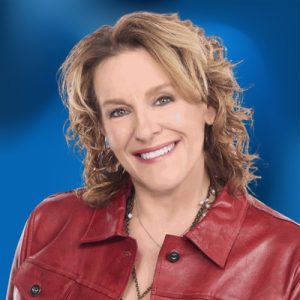
With over two decades of experience spanning finance mentoring, real estate, business acquisition, and alternative assets, Loral has been featured in Forbes, The Wall Street Journal, CNN, CNBC, and more. She’s on a mission to change the conversation about money and hosts the popular Real Money Talks podcast, reaching millions worldwide.
The Truth About Financial Literacy Schools Don’t Teach — Loral Langemeier
The Missing Piece: Why Schools Don’t Teach Wealth Building
Welcome back to Real Estate Investing Demystified, everybody.
This show has been going on now for over five years. We’ve learned so much on this show with some tremendous guests we’ve had and so many things we didn’t even know existed. Particularly in the finance world, investing world, financial literacy and other factors and in real estate as well. There were a lot of different ways to skin a cat, as it’s known. Not a good adage but it is.
We started the show because it was so fascinating and quite the contrary of what we learned when we were growing up and when we went to school. A lot of people that go to school, we learned math and nobody teaches us on how to build wealth. That’s the biggest missing part in this society is what I believe. Another thing I wanted to mention is, 70% of people who win the lottery go broke for like five years or in two years. Money making isn’t the same as keeping it or growing it. We’re going to dive into all of that with our guests. We’re excited.
I’m going to dive in and introduce our guests. It’s Loral Langemeier. Loral is a global wealth expert six-time New York Time’s Bestselling Author and CEO of Integrated Wealth Systems. She is known as the Millionaire Maker. She has helped over 10,000 clients reach seven figures success through her proven strategies to make, invest and keep money.
With over two decades of experience spanning finance, mentoring real estate, business acquisition and alternative assets, Loral has been featured in Forbes, The Wall Street Journal, CNN, CNBC, and more. She’s on a mission to change the conversation about money and hosts the popular Real Money Talks reaching millions worldwide. Welcome to the show, Loral. We’re happy to have you here.
Welcome, Loral.
From Farm Girl To Millionaire Maker: Loral Langemeier’s Origin Story
Thank you. I’m excited to be here. We’re going to have a great chat.
Let’s dive into things. I’d love to hear about your beginnings and learn how you found yourself and what we call the money coach, probably the money mentor. For example, I can give you a quick overview of how I got started in my career. I got into real estate at a very young age. I was 22 years old and I started my real estate career in a small town in Alberta. I did well. Everybody knew, liked, and trusted me, then I moved to the big city, which is Vancouver City in British Columbia.
I started to excel in real estate and I surrounded myself with incredible people like August. I was able to cofound CPI Capital, where now it’s real estate private equity. We partner with investors to acquire and manage multifamily and BTR assets in Florida and Texas. Give us a quick background about how you got here, Loral.
I grew up in a farm in Nebraska. A similar small town story. At seventeen, I was headed off to college university. I went to a workshop because I was going to head off to play basketball, so it was a team event. Dennis Waitley was there and back in the day, still if their stages, “Run to the front of the room.” I ran to the front of the room and I got Think and Grow Rich. That was my definitive 17, almost 18 year old beginning.
You can imagine reading Think and Grow Rich just from a farm girl from Nebraska and just that conversation in a small town and as you said, wealth building is possible. I changed my degree. I got a business degree. I went to an investment banker for about one minute. Literally, it wasn’t even a day and I said, “Not going to do this.” I went back to university and got a Master’s in Exercise Physiology and I put those two degrees together on analytics and started corporate wellness in the ‘90s.
In early ‘90s, I went to Chevron in New Orleans on a big contract to 24 years old. It’s another next defining moment. I say those because people that are reading should start defining the chapter of their life and the big, “I caught the yes moment.” When you say yes and then you have to figure out how to get this thing successful. I built 272 fitness centers. I ended up in San Francisco after a long journey working with Chevron. In 1996, fast forward, Bob Proctor had been a long time mentor since I was 21.
In college, I figured out how to pay him $25,000 to start mentoring me on this Think and Grow Rich journey that I was on. He called in 1996 and said, “I think I have your transition.” He introduced me to Robert Kiyosaki and Sharon Lechter. That was again a definitive moment. I left the master’s degree of the cashflow game, put cashflow and the cashflow clubs all over the world. I worked till 1999 to 2000 with them.
In 1999. I had my son and became a real estate millionaire. Again, I did what I’ve been resisting. I paid a gentleman $25,000 and said, “I need to be a millionaire in real estate now.” He said, “Why?” I said, “I’m going to be a single mom in September. Let’s go.” Oklahoma City, again Texas, that whole mid-West corridor and I became a millionaire in June of 1999. I’d say I haven’t looked back, but it’s been a fun journey.
In 2000, I left on my own. I started to live out loud, which is now the Integrated Wealth System. Anybody watching, I have IntegratedWealthSystems.com and we’ll talk more about what I do in that journey with clients. I say the last big chapter was in 2005, when McGraw Hill said, “Write the Millionaire Maker.” That was a defining brand moment for me. Prior to that, 2000 to 2005, I did real estate tours. I took people to Norman, Oklahoma, Oklahoma City, Fayetteville, Arkansas, and New Jersey. We would travel and we do real estate tours to show people how to start buying real estate. I did that for quite a while and then transitioned Into the Millionaire Maker. That’s a high-level overview, lots of chapters and a lot of experience.
A tremendous background.
I can’t believe she was seventeen when she got her hand on Robert Kiyosaki’s Think and Grow Rich and that’s when her mindset shifted because talking to the thousands of investors I’ve spoken to, a lot of people don’t understand about investing or building wealth until they’re in their 40s or 50s. Good for you. Loral, can you give us a crash course on your platform on how you help people? Maybe you can walk us through the journey if someone sees you on our show connecting with you and then they’re looking for a money mentor. How do you help them?
Your Path to Financial Freedom: A Crash Course in Loral’s Platform
It’s the first time ever on a show I was asked that, so I love that question. You’ll find me from here and typically, you’ll go to AskLoral.com. Ask a question and make a request. I have a gift link for all of your readers to go get two tickets to my Millionaire Intensive. A lot of times that’s the first meeting. It’s an all-day event in 2025 and ‘26. We’re going to be making it only a two-hour event. We’ll be doing it monthly but it’s what I call the building blocks and the sequence of How To Be a Millionaire because as you said, so many people don’t even understand how to get started.
I call it a condensed crash course. The first two hours are literally how do you do a gap analysis, where you are, and what do you want. In our mentoring and masterminding, we focus on income, which is business development. We also focus on investment education. We don’t do investments. We teach them how to read a PPM. For example, how to look at different asset classes, how to do due diligence, and how to have money rules.
Once we know where they are and what they want when they come in a variety of paths to us. It’s usually an income based generating more active income in service of generating the highest portfolio in wealth building that they want. They become a business owner if they want the tax strategy and investing for even further tax strategies. A lot of our journey with the client will start with an on board. Once they decide, “I want to be a client.” There’s an onboarding to our academy and into our expert system. It’s me and 28 experts in almost every financial category.
After they get onboarded, they meet with me one-on-one and I do what’s called the sequence, which is based on what they’ve done to themselves. Do they need to generate more income? Most people need a tax plan. They have a horrible tax plan. They’re overpaying taxes in any country. The United States does have the greatest tax code in the world. We usually will look at their corporate structure. I teach a principal called Living Corporate Life. Companies should make money, not individuals.
Most people need a tax plan. They have a horrible tax plan, overpaying taxes in any country. Share on XThere’s a reroute of their entire financial foundation from taxes, corporate structure, corporate compliance to getting a trust. A lot of people don’t have trust, so the land is probated. I say, why build wealth and a legacy if you’re going to end up in probate court? The court is going to take it anyway. When they join, regardless if they want the income tax strategy or the investment education, which are the three big pillars. They all get a foundational reveal because most of them are under structured. It means they’re overpaying tax. They don’t have a trust, their RSPs in your case, or down in America, the 401(k)s aren’t set up. They’re life insurance is not right.
When we say integrate, we’re taking everyone in this segregated financial space and giving them an integrated team. Basically, they’re not just paying for me and my expertise. They’re paying for access to a team that they acquire over the time that they’re with us. It’s very real. The result isn’t just sitting in class and learning. Now I have a new tax strategist. We have the same resources in Canada. I was married to a Canadian for nine years, so we’re heavily set into the Canadian markets and the Mexican markets.
They will leave a corporately structured and great tax plan. They’ll get a new tax strategist. Usually a new trust attorney. It’s typically an overhaul of the foundational level where then we go on to work on income and investment education. Why grow in either of those categories when your foundations are wrong?
Building Your Wealth Team: The Power Of Integrated Financial Support
It seems you have a robust onboarding process. These service providers and experts that you have, do they get access to them as well if it’s their legal advisors?
They become theirs. They’re going to pay them to do their tax return. They’re going to pay them to get their corporate structure. They become their team. It’s not just an introduction for a short-term little seminar. It’s a lifetime membership. They could then buy a new team, which is basically what they’re getting. I help facilitate the interactions and the integration. My key role, where I spend the most time with my client, is clearly business development.
I know how to grow 7, 8, 9, and 10 figure businesses. That’s marketing and all of that. I do a lot of that intimate work with people, but just as importantly, I spend a lot of time in their new foundation. Whether it’s a Canadian or American, we’ll just use those terms. If you have you as an individual and say three companies. Which company now pays for your cell phone? You don’t. You shouldn’t pay for your phone or your car. You just have a home office. I have wardrobe deductions because of what I do.
There’s so many deductions and ways to reduce your taxes. We find people for the cost of our membership, sometimes they’ll get 1, 2, 3, or 5 times back in their original tuition just in tax return reviews. Most people do tax, and it’s a worldwide problem. Not just US and Canada. I call CPA historians because all they do is like, you say, “Here’s CPA or tax or accountant.” In Canadian terms, “Do my taxes,” and then it’s hands off. You should be meeting with them quarterly and the higher your net worth and investment strategy monthly.
Have a plan. Every move you make has a tax consequence. Why do you not have them at your side and not just doing a review of your year? There’s no strategy in that. Whatever you did, it’s over. Now, we’re doing massive messaging. Now is when you plan your 2025 and you should know by November what your tax consequence for 2025. It shouldn’t be a surprise as we move into the next year. We do a lot for the client and then we do a lot with the client, if that makes sense.
A lot of times, they won’t do it, so we just do it. We just have bookkeeping teams and paralegals teams. They just get it done so the clients are taken care of. Where I spend time is like, “Ava, you now have three companies in you. Which credit card are you going to use? How are you fully going to run the business?
Many people just leave it with their lawyers and accountants. I don’t think so. I know that one of the greatest wealth building mistakes people make is just thinking you can throw stuff back to an accountant and a lawyer and think they’re going to handle your life for you and your legacy. It’s time for you to stand in front, take leadership in your own life. They work for you, by the way.
The problem is that a lot of people hand their stuff to their accountant. Their accountant does a tax return and their accountant isn’t or maybe isn’t aware of all the tax strategies that they should be using as well. They just throw something together. They file taxes and that’s it. Finding the right account I’d say is probably the biggest.
This is more than that because it’s just finding the right account. It’s an accountant that’s servicing all of these investor types that are coming from this one platform. You got to take better care of them because there’s a lot of business coming to you. They’re going to be taking care of it at a much higher level and they have seen a lot of different problems.
That’s hard for people. That’s what I’m saying. It’s finding that accountant.
Come to us. We’re a one stop shop.
Exactly. I love it.
We meet as a team, Canadian and US. We go through a strategy like now, the US has what’s called the big beautiful bill, which is now a law. It’ll get more aggressive in ‘26. That came out July 8th, for example, the seventh. Our tax strategist, that’s what we call them. We don’t call them accounts or CPAs, just to differentiate. We’re going to strategize your life forward. Not just do a historical review of what you did. It’s a very active engagement. It is very different. To your point, my message is not to go out and find someone new. Come to us and let me help you find somebody. I’m not training yours. I want to qualify that. Don’t hand me your person and think I’m going to train your person for you. You’re going to get rid of your person and come here.

Financial Literacy: We’re going to strategize your life forward, not just do a historical review of what you did.
We want to extract as much information from you as possible, so let us get to the next point here.
Beyond Trading Time For Money: The Investor’s Realization
Let’s discuss the investment journey. Step one, there’s people wanting more for their life. They want more than just being a business owner. They want more than just being an employee and just trading the time for money. This is more of a realization that investing exists and building wealth exists. Let’s spend some time on this. The clients that come and see you, have passed this realization. They’re on this journey because at some point they realized that rather than trading their time for money. They want to get their money working for them and they have started to get their money for working for them. Talk to us about that.
Do you provide a lending hand to these individuals to utilize investing as part of their lives had they already made that decision? Talk to us about a starting investor type that comes and sees you.
The people who come to us come for holistic integration. Investing is a part of it. It’s not all of it. The biggest pattern we teach is because I do a lot of behavioral teaching with money. As we said earlier, most people have no idea what a wealth builder is or even the opportunity to be an entrepreneur. My YouTube channel is from five years old and up as family friendly intentionally to put this together. It doesn’t have to be these phases of the segregated approach. It’s very integrated.
When they’re foundation is ready, and they have money. Whether it’s RRSP, 401(k) money, cash, their businesses thriving, a high-income earner or make a lot of money but they’re over paying taxes. Investing is got to be part of the tax plan and real estate, gas and oil. In aviation, there’s a lot of depreciating assets. We start all of the education straight away like the first thing. In fact, my mentoring is called the big table because you’re getting a smorgasbord of the entire table and they’ll start consuming it.

Financial Literacy: Most people have no idea what a wealth builder is or even the opportunity to be an entrepreneur.
I have real estate leverage, how I became a millionaire, an eight-week course. They get all that for a part of their membership. As you said, do I do a lending hand? I do an educational hand. We won’t do it for them but we educate them on how they get started in real estate or if they already started. I have people coming to me that are worth $10 million. They plateaued out in their real estate investing and they want to go to the next level, take on bigger projects and do syndications like you guys are doing. It depends. They could be a beginning investor to a very advanced company that needs support on the next level. Our range is wide because I have such a big team of support.
Active Investing Vs. Park And Pray: Engaging With Your Investments
Investing in particular is a very important component of this because with somebody just being a high income earner, coming and seeing you and saying, “Help me with tax strategies.” That investing component, which Ava mentioned, is allowing their money to work for them, rather than exchanging their time for money.
It’s two things in our world, especially in the US. You get bonus depreciation. Having real estate in your portfolio is vital. Again, they get to make their own decisions. We do have some folks that are licensed where they need to be licensed to tell them to do it. Our approach is, we’re going to teach you to fish. We’re not fishing for you. We have all sorts of education. We have passed PPMs, for example. We’ll have a class where we’re just dissecting a deal. Maybe it will be one of your past deals and what was good about it.
That’s how we teach through real-life examples of what happened. I always say with the PPM or some project is, “Would you do it? Yes or no?” Here’s the hardest educational question. If you had to make it a yes, what would you have to change? Would it be the management team? Sometimes it’s just the fundamentals. It doesn’t work. Would you change the marketing plan? Would you change the sales approach?
I did a lot of land development in the last few years. Do you develop all of the property or do you sell out parcels? We give a very broad education of all of the kinds of investing that they could do and point them to real life examples. As I said, I’m over 10,000 millionaires. In almost every category in the industry, I’ve got a millionaire. We put them together. It’s a true learning environment, real-life. People fly to different people’s projects to see projects. We’ve got a variety of people to do those projects across the country, solar projects, and manufacturing projects.
Our clients do a lot of cool stuff, and that’s where they find each other. As far as the money working for you, it’s so interesting getting people to understand what does that mean. I don’t think there’s such a thing as true passive. If you’re truly passive like if I did a deal with you guys. I wouldn’t just sit back here passively and say, “Ave, Arthur, I hope it all works out.” I want to look at your quarterly statements. I want to be involved as an investor.
Many don't want to learn; they just want to park and pray, yet they desire the results of someone who's active. Share on XWe teach them that side of it that this isn’t the park and pray method like with your syndication. You need to be involved. If they have a shareholder meeting or an investor meeting, you go to the meetings. You start learning and listening. If you’re very smart, you’re going to go visit the project and make sure you understand what you’re investing in. I do a lot of behavioral push. There’s a lot of people who don’t want to learn it. They just want to park and pray, but they want the result of somebody who’s active. It’s like, you’re not going to get the home runs if you don’t have to do the singles.
Tailored Wealth Strategies: Investing For Every Net Worth
Loral, give us an idea of the net worth of your client. You mentioned somebody that might have $10 million. Do you have a blue collar who makes $50,000 as well? Do you have a whole spectrum?
I got a whole spectrum. I have people who are just beginning on this journey. A gentleman who ran syndications and then came at the end of that wanting to reset over $100 million portfolio in real estate through 1031 and through new strategies to be less on the front of the syndication and become more of the passive positions. It’s a wide range and we have wide support. It’s very unique. Most people say, “How did you build it?” I said, “It’s built by the client base.”
As clients came, they kept asking for more and more. It just got wider. I’m a millionaire in eight different industries. Real estate is only one of them. I’ve had recycled glass. I have done supplement businesses. It’s a pretty wide range that we educate, teach and point to. We’ve done a lot of franchise work with our clients. We’ve started some franchises and tutor doctors.
With the spectrum of clients that you have coming to you, your advice to them has to almost be tailored made because you have this person that comes to you and now they believe that they have to be an investor alongside whatever it is that they do or maybe even completely transition into being an investor. How do you advise your clients? What options exist for them?
I’m sure you’re aware and we’re aware, correct me if I’m wrong. Depending on the investors net worth, liquidity and income that they make. The investment allocations will have to be different and tailor made and the advice that you give them. Somebody with $20 million in assets, let’s say, might have a different diversified portfolio than say somebody who only has $50,000 that year to allocate to something.
The age as well. Somebody who’s younger can take a bit more risk. Somebody who’s older wants a little bit more passive and less risky.
What are your thoughts on that, Loral?
I’m going to say thoughts and I’m going to address this correctly. I don’t give any advice. I’m not financially licensed to give advice, so there’s no advice on my side. Mine is education. I do a lot of my education and we do it as a team through scenarios. For example, Ava, you came on. I’m not running your spreadsheets for you. We don’t have that level of detail unless you hire those levels of financial analysts. We do have financial analysts that you can hire. They will do it. Again, that’s something you need custom to your team because you don’t have a team to put that together.
We have people to supplement teams. The people that are higher net worth typically would have a financial advisor or their own in-house tax strategists on their team or they’ll use our tax strategist with their financial analysts. We have people who build five family offices out of here. The detail down to spreadsheets, I am never at that level. Our tax strategists and the bookkeepers are if they employ the financial analysts.
Again, my goals are to show you what a smart board of an expert team and a wealthy team should look like and we go from there. I teach in broader terms and then one-on-one. The client also gets a coach in the area of expertise they want to grow. If it’s real estate, I’ve got multi-millionaires in real estate. Our coaches have come through our client base. They are walking testament to the work. They know the foundational work that needs to be done.
They know tax work is imperative. We lead with tax, so where you should buy properties and how you buy and what you buy. For example, in syndication, they would have a different depreciation schedule than buying directly themselves into their own LLC. If they need that, then that’s where they would go look.
Most financial planners will follow their broker-dealer's pie chart, which is largely stock-based, not real estate-based. Share on XYou got it tailor-made for all types of investors. Talk to us about one more thing. Being in the syndication space and falling under the category of alternatives off the Wall Street type of investments. A lot of large institutions invest in alternatives. You have university, endowments, pension funds, and sovereign wealth funds. They do all have an allocation to alternatives. Be it a smaller allocation.
When it comes to the function of a financial advisor. Is a service provider that works hand-in-hand with somebody who comes and sees you? Is your thesis that a financial advisor might not allow someone to have enough allocations and alternatives? There’s better ways to invest. What is your view on financial advisors overall?
They are traditional and they work for a house. Whether it’s just Schwab, Fidelity, or whoever. Their typical self-direction is they’re only going to allocate back to their own financial vehicles. They’re not going to go out. There are some alternative financial advisors, which we do have some of those on the team for the people who do not want to make a decision and they have to have an advisor with those licensees to do it.
They can go meet with them. Again, ours are very alternative centric. What you’re going to find out in the markets, which is why I call it park and pray, is most financial planners are going to do what their little pie chart from their local broker dealer is going to tell them to do. Which most of that is as you know is stock based and not real estate based.
It’s fixed income and equity. It’s bonds and stocks. It’s been classic. It’s been like that forever.
We’re levelling into my third Millionaire Maker book. My first one is The Millionaire Maker. The second is The Cash Machine on how to build a seven-figure business and the third is Wealth Cycle Investing, which is how to invest in the alternatives.
Beyond Inheritance: Crafting A Lasting Legacy
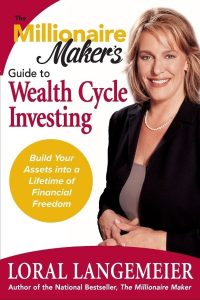
The Millionaire Maker’s Guide to Wealth Cycle Investing: Build Your Assets Into a Lifetime of Financial Freedom
We want to run through a few more things. We still got our second segment of our show, so let’s run through some of these quickly as possible. Let’s talk about legacy. I’ve watched a couple shows you’ve been on prior to coming on ours, getting to know more about you. Talk to us about someone who is later on in their investing journey that has done well. They have a good nest egg or have a company that they could liquidate or they’ve recently liquidated. What does that look like? What is your education there when it comes to financial literacy of what should that transition look like?
Is it just mainly focused on putting together the right trust? Do you chat at all about maybe their kids taking over their business? How involved do you get in someone who’s sitting on a $10 million business that they’re about to sell or they just have sold? How involved are you as far as what they should do? Are you a sound sounding board? How involved do you get?
Again, I’m 100% on the behavioral side, down to how they pay bills and function inside their corporate structures, which most people do not know how to function inside their corporate structure compliance. When it comes to legacy, again, big conversations. A legacy is divided into two things, the inheritance, which is the stuff you’re giving away and then the legacy which is the roots, the wings like in the values. We teach Rockefeller style. If you’ve amassed this wealth and you have a $10 million company, first of all, should you or not sell, is a legacy decision based on tax.
We lean heavily into, do you want huge capital gains on that or do you want that to be bought over time? Again, our tax teams are heavily involved. The legacy part I spent a ton of time with is that most people have a fair amount of money, even if it’s only half a million dollars. You’re literally going to leave it to trust fund kids or educate kids. Our charity has always been bringing your kids for free. Parents or grandparents become clients of ours. I want those kids coming because if they’re going to inherit it, do they have the will and wishes, especially like with real estate.
The last thing you guys want is someone to pass, not have a trust or whatever ends up in a probate court. Obviously, you need trust. In a lot of cases, if you have three kids and they’re very different like my kids. I have two kids who are very different. They each have their own trust. They have their own rules and their own way that they’re going to get there. The number one breakup of a legacy is within two years. There’s no blueprint for the kids. It was a disaster when they got it and the worst case is they’re in probation but let’s just say they got through it.
The daughter doesn’t want to manage the real estate or the son doesn’t want the cannabis business or whatever it is. They should have already had the assets, in my opinion, transferred to the kids. When they pass, it should like games out. The work has been done and the kids own it. The kids run it. They don’t destroy it, they don’t sell it off and don’t go into lawsuits. I do a lot behaviorally. If you’re going to do this, you’ve got to get your kids in line.
A quick question for you. If somebody comes to your platform, they have that initial onboarding call with you. How accessible are you to them? Can they book calls with you?
Absolutely. In the beginning, it’s usually the first eighteen months to two years that they need a lot of help because it’s such a different life. I’ve been doing the big table since 2001. I have had clients for 25 years. They’ll come to me maybe once or twice a year because they need to reset. The first year or year and a half, it’s a lot for a family to reset their entire life, living corporate life, or living through companies and trust structures versus their own personal bank account.
Let’s run through a few more quick questions before we get to the second show. I think it’s a good one here. Ava, ask this before we move on.
The #1 Financial Mistake (Even Successful Entrepreneurs Make)
I did have a question I wanted to ask you, Loral. What are some of the most common financial mistakes you see even successful entrepreneurs make?
They pay off debt too soon all the time.
I love that. That’s contrarian when it comes to Dave Ramsey because he talks about paying everything off. I don’t agree with that, especially in the US. You can get a 30-year term mortgage. In Canada, it’s five years. You get that at a low interest rate, you’ve had the lotto. The most millionaires around the world are because of that primary resident, that equity of building that property over the years. Taking a mortgage and buying your property is probably the smartest thing you could do. Let’s get started on the second segment of our show. Let’s bang this through. Thank you so much for everything you shared. I can’t wait to come to one of your events.
The Championship Rounds: Quick-Fire Wisdom For Financial Freedom
Here we go. The ten championship rounds to financial freedom. Loral, are you ready?
I guess I’m ready but before that because I don’t want to go too far to the end. If you can put AskLoral.com/Podcast then they can get the two tickets. They get my whole Millionaire Maker book, eBook and a whole bunch of gifts. Get all the goodies.
Thank you for that. First question. Who’s been the most influential person in your life?
Bob Proctor.
Give us a quick background why.
He’s my mentor from 21 to about 35 and then I became a business partner for seven years. We made millions of dollars together as business partners then we just said dear friends until his passing. I was the last endorsement on my Make Your Kid’s Millionaires book four days before his passing.
Loral, next question. What is the number one book you would recommend?
Aside from all the books that you’ve written yourself.
I got to put Think and Grow Rich because it was my seventeen year book.
Great recommendation. I have it sitting here.
Next question. If you had the opportunity to travel back in time, what advice would you give your younger self?
I love that one. I can go so many ways. I’d say hire faster. Hire the people you need faster to get those who have the skills on your team as fast as you can, even if you don’t have the money. I don’t care if you take out a 0%, 2%, 3%, 4%, or 5% loan. Get a team because you cannot do it alone.

Financial Literacy: Hire the people you need faster to get those with the skills on your team as fast as you can.
Amazing advice. Next question. What is the best investment you’ve ever made?
Myself. My kids. Education. Learn.
The next question is, what’s the worst investment you’ve ever made? What lessons did you learn from it?
I would say worst investment is not necessarily a category. It’s, the team got greedy or the team that I invested in fell apart and the deal went South. I say it’s got to be in the team category of why my deals fell apart, especially alternative deals. The deals broke up. Somebody died. I’ve had that happen, where we ended up in probate with it or part of the syndication. It’s a deal falling apart because of the partners. I constantly work on that now, how do you put better structure around the responsibility of the team?
Next question, Loral. How much would you need in the bank to retire now? What’s your number?
I don’t like the word retirement because it’s agricultural. It means to go to pasture to die. If I want to just stop, first of all, I like too much of God’s plan. I would have been gifted the most amazing gift to see money sequences and behavior. I’ll do what I’m going to do until the day I die just like Bob Proctor did. I don’t know if I have a number because I have a huge asset base, which then generates a huge life. As we went to the show, I told you my daughter became a pilot. I’m going to have to buy another plane. I don’t even have the psychology for that one.
I would say most people. I’ll just go there. Most people, if they did it right, could do anywhere between $3 million to $5 million and be okay. If they’ve had a bigger experience in life like I’ve had, it is going to have to be in the $5 million to $10 million or $10 million to $20 million. It’s whether you are willing to shift and I’m not willing to shift any of that. I’m in a fun jam.
You’re enjoying your life. That’s amazing. Next question, Loral. If you could have dinner with someone dead or alive, who would it be?
I traveled the Trump tour back in the day. That’s how now I dated myself a lot. When he had Trump University right before the Rich Dad, Poor Dad sold to Russ Whitney and that whole crew. I would like to, at this point, go back and have dinner with Trump. It’s been that long since I’ve been with him one-on-one.
My sister just had dinner with him not too long ago. She used to be Miss Universe and used to work for Trump. She was in Mar-A-Lago not too long ago.
Next question is, if you aren’t doing what you’re doing now, what would you be doing?
If I didn’t become the Millionaire Maker, which again that was a McGraw Hill saying, “Want to write a book?” I’m like, “I don’t know how to write a book.” That’s a whole story and a whole episode alone. I would probably still be doing real estate just focused on singularly real estate. I had that gas and oil like background because of Chevron. I worked there. I’d probably be doing real estate gas and oil deals.
How about anything related to basketball? You used to play.
Yes. I still like to shoot around. I’m not that great. I ski. If I could do nothing, nothing. I’d ski. I’ve skied all over the world and I still ski. I will continue to ski.
I was going to say come meet us in Colorado.
I’d rather go to your world. I’d rather go kicking horse. I went to Whistler last Christmas with my daughter.
Next question, Loral. Book smarts or street smarts?
If I had to choose, I’m going for street smarts because I can tell you, that’s how I’ve learned it.
Last question, Loral. If you had a million dollars in cash and you had to make one investment now. What would it be?
Real estate. I know where I go. I know what I want. I buy land over and over.
We’re going to ask you to tell people how they can reach out or connect with you. You mentioned earlier but maybe say it quickly.
AskLoral.com/Podcast. You get all my gifts. You can ask a question there and that’s how we begin this journey.


